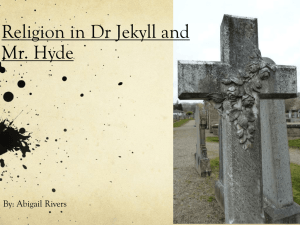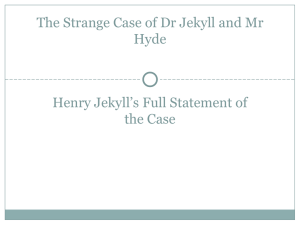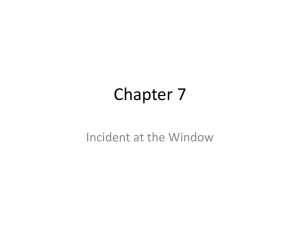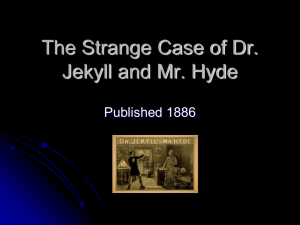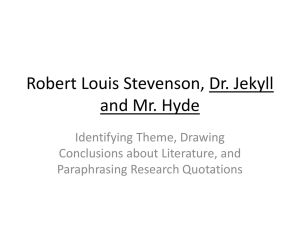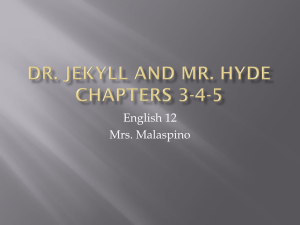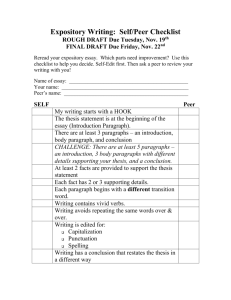Expository essay handout.doc
advertisement
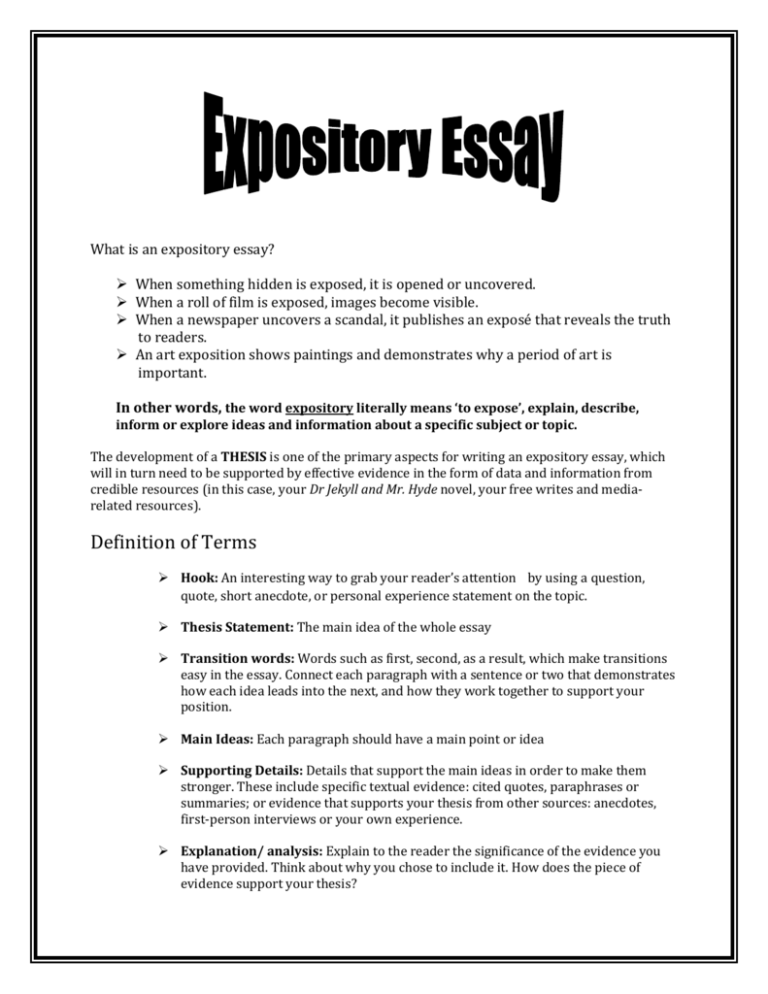
What is an expository essay? When something hidden is exposed, it is opened or uncovered. When a roll of film is exposed, images become visible. When a newspaper uncovers a scandal, it publishes an exposé that reveals the truth to readers. An art exposition shows paintings and demonstrates why a period of art is important. In other words, the word expository literally means ‘to expose’, explain, describe, inform or explore ideas and information about a specific subject or topic. The development of a THESIS is one of the primary aspects for writing an expository essay, which will in turn need to be supported by effective evidence in the form of data and information from credible resources (in this case, your Dr Jekyll and Mr. Hyde novel, your free writes and mediarelated resources). Definition of Terms Hook: An interesting way to grab your reader’s attention by using a question, quote, short anecdote, or personal experience statement on the topic. Thesis Statement: The main idea of the whole essay Transition words: Words such as first, second, as a result, which make transitions easy in the essay. Connect each paragraph with a sentence or two that demonstrates how each idea leads into the next, and how they work together to support your position. Main Ideas: Each paragraph should have a main point or idea Supporting Details: Details that support the main ideas in order to make them stronger. These include specific textual evidence: cited quotes, paraphrases or summaries; or evidence that supports your thesis from other sources: anecdotes, first-person interviews or your own experience. Explanation/ analysis: Explain to the reader the significance of the evidence you have provided. Think about why you chose to include it. How does the piece of evidence support your thesis? Outline for an Expository Essay • Title__________________________________________ • I. Introduction: • A. Hook______________________________________________________ • B. Background information on the novel______________________________________ • C. Background information on topic_______________________________ • F. THESIS STATEMENT________________________________________ • II. First Paragraph: • Topic Sentence/Main Idea • A. Fact/ or example_________________________________________ • B. Detail/Explanation________________________________________ • C. Fact/ example___________________________________________ • D. Detail/ Explanation_______________________________________ • E. Fact/example____________________________________________ • F. Detail/ Explanation_______________________________________ • G. Sum- up statement_______________________________________ • III. Second Paragraph • Topic Sentence/ Main Idea • A. Fact/or example_________________________________________ • B. Detail/Explanation_________________________________________ • C. Fact/example____________________________________________ • D. Detail/Explanation__________________________________________ • E. Fact/example____________________________________________ • F. Detail/Explanation___________________________________________________ • G. Sum- up statement_______________________________________ • IV. Third Paragraph: • Topic Sentence/ Main Idea • A. Fact/example___________________________________________ • B. Detail/Explanation________________________________________ • C. Fact/example___________________________________________ • D. Detail/Explanation_________________________________________ • E. Fact/example___________________________________________ • F. Detail/Explanation V. Conclusion: Re-state all reasons in conclusion. Clincher sentence- gives a summation of the above and a “feeling” about the whole essay. Use transition words, plan reasons in a logical order, make sure you re-state reasons in your conclusion. Make connections for the reader in your conclusion. You should refer back to your thesis, but don’t simply restate it. Use some of the following questions to guide you: o o o o o Did you propose any solutions? Are there solutions yet to be discovered? What questions still need to be answered? What is the larger significance of the topic you chose to write about? What should the reader do or think after reading your paper? YOUR TASK: You are required to write an expository essay (500-800wds) on one of the themes presented in Stevenson’s The Strange Case of Dr. Jekyll and Mr. Hyde. You must prove that this theme is true by “exposing” it based on: 1) A personal experience (i.e. look through your free-writes for inspiration). 2) Connecting it to a form of media (i.e. novels, short stories, films, TV shows, songs…). 3) And the novella, The Strange Case of Dr. Jekyll and Mr. Hyde. ***DUE DATE: Tuesday, November 6th, 2012*** Themes in Dr. Jekyll and Mr. Hyde Dual Nature of the Self or Split Personality o What causes a person to act in such radically opposite ways and what does this suggest about human personality or human nature? o In Dr. Jekyll and Mr. Hyde, the allusion to the story of Cain and Abel is an example of how evil nature and good nature are personified as existing in two separate persons, who struggle against each other. o Horror and gangster films and fiction often explore the dual nature of a criminal by showing an evil person performing an act of kindness. For example, in the film The Godfather the gangster hero is shown playing with children and interacting with family and friends. Limits of Scientific Experimentation o Dr. Jekyll decides to test his theory of the two sides of human nature by performing an experiment on himself with potent drugs. He knows death is possible but decides the potential knowledge is worth the risk. o Today scientists explore the possibilities of cloning and creating life, for example. What are the ethics of experimentation on human beings? Have you ever participated in a study of some sort? o What other novels, films, TV shows or songs explore the ethics of experimentation on human beings? The Effects of Society on the Individual o In Dr. Jekyll and Mr. Hyde, Stevenson shows the civilizing influence as well the restricting and debilitating effects of society. The benefits of society can be seen in the compassion shown to the little girl trampled by Hyde and the social outrage and response to the murder of Carew. The negative effects of society can be seen in the repressed and restricted behaviors of Mr. Enfield and Mr. Utterson and the duplicity shown by Dr. Jekyll, a member of elite society who is a reputed social benefactor. o Is your behavior in a private space at home similar with the way you act in the public sphere of school, sports, or work? o Whenever Dr. Jekyll wants to change into his “darker” side, he seeks isolation. He wants to maintain his respectable role in the community while he engages in activities not acceptable to society. What other novels, films, TV shows or songs explore what happens when people are freed from the restraints of society and the role of the community to maintain moral behavior?
